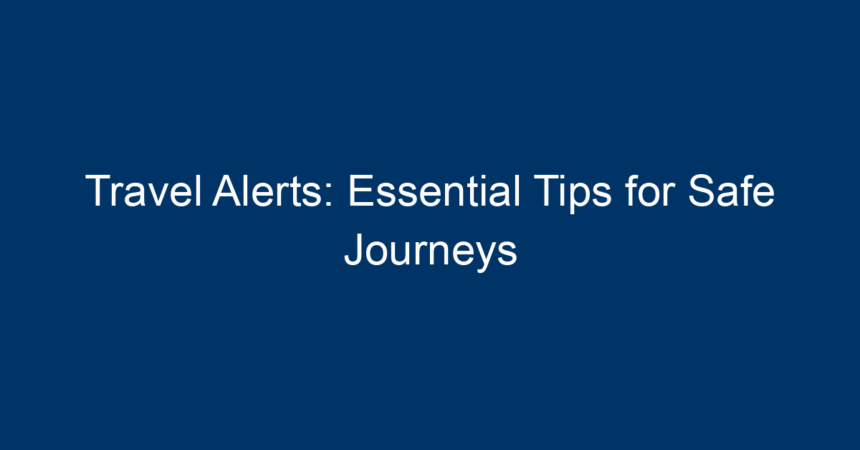Traveling can be one of life’s greatest joys, offering a chance to explore new cultures, enjoy stunning landscapes, and create lasting memories. However, unexpected risks can arise, making travel alerts an essential part of your journey prep. In this guide, we’ll uncover critical tips to keep you informed and safe while traveling.
Understanding Travel Alerts
Travel alerts are notifications issued by governments, organizations, or travel companies to inform travelers of safety concerns in specific regions. These alerts can cover a spectrum of issues, including natural disasters, political unrest, health risks, or other emergencies. Staying updated with these alerts ensures you can make informed decisions and adapt your travel plans as necessary.
Why Travel Alerts Matter
-
Safety First: The primary purpose of travel alerts is to inform travelers about safety risks. Awareness of these alerts can help you avoid dangerous situations.
-
Flexibility in Planning: Adjusting your itinerary based on the latest information can save you from potential disasters.
- Peace of Mind: Knowing that you are informed allows you to relax and enjoy your journey fully.
Where to Find Travel Alerts
With the rise of technology, accessing travel alerts has never been easier. Here are some reliable sources you can refer to:
Government Websites
-
U.S. Department of State: The website offers travel advisories categorized by country. Regular updates ensure you receive the latest information directly from an authoritative source.
-
Canadian Government Travel Site: Like its U.S. counterpart, it provides alerts specific to Canadian travelers.
- Local Government Agencies: In many countries, local agencies issue alerts that can offer detailed information pertinent to specific regions.
Social Media & News
-
Twitter: Many government agencies announce urgent updates via their Twitter handles.
-
News Outlets: Major news channels often cover significant events that could impact travelers.
- Travel Blogs and Forums: These platforms can provide firsthand accounts from travelers who are currently in the affected regions.
How to Stay Informed
It’s crucial not only to find travel alerts but also to stay engaged with ongoing updates. Here are some actionable strategies:
Subscribe to Alerts
Many travel organizations and government websites allow you to subscribe to email alerts. This feature sends critical updates straight to your inbox, ensuring you never miss important information.
Use Apps
Several mobile applications provide real-time travel alerts. Some popular apps include:
- TripIt: Keeps your travel itinerary organized and offers alerts.
- TravelSafe: Offers safety information, emergency numbers, and travel alerts based on your location.
Join Travel Communities
Online travel forums such as TripAdvisor or Reddit’s travel community can be invaluable. Connect with fellow travelers, as they often share the latest travel alerts and insights from their adventures.
Preparing for Travel Alerts: Essential Tips
Planning for the unexpected can make a significant difference in your travel experience. Here are some essential tips on how to prepare for potential travel alerts.
Research Your Destination
Before embarking on your journey, invest time in researching your destination. Websites like the U.S. State Department provide detailed travel advisories and current events that can affect your trip.
Create an Emergency Plan
An emergency plan can be a lifesaver during uncertain situations. Here’s how to create one:
- Know Your Exits: Familiarize yourself with key locations like hospitals, embassies, and police stations.
- Emergency Contacts: Keep a list of emergency contacts, including local authorities and your country’s embassy.
- Travel Insurance: Always have comprehensive travel insurance that covers emergencies, cancellations, and medical issues.
Stay Flexible
Your ability to adapt can significantly enhance your travel experience. If a travel alert suggests a safety concern at your destination, consider evaluating alternate routes or destinations.
Practical Safety Tips While Traveling
Even with thorough planning, it’s crucial to be vigilant and prepared during your travels. Here are some practical safety tips:
Stay Informed
Make it a habit to check travel alerts daily. Changes can happen rapidly, and staying informed can keep you ahead of any potential issues.
Follow Local Guidelines
Adhering to local guidelines and regulations can often minimize risks. For instance, if a travel alert suggests avoiding a certain region, heed that advice and stay informed about the latest updates.
Maintain a Low Profile
Sometimes, traveling under the radar can reduce attention on you as a tourist. Avoid displaying expensive items, and dress modestly to blend in with the local population.
Trust Your Instincts
If something feels off, trust your instincts. Avoid situations or areas that don’t seem safe, and always prioritize your well-being.
Dealing with Travel Alerts During Your Trip
In the unfortunate event that you encounter a travel alert while traveling, here’s how to respond effectively:
Stay Calm
Panic can cloud judgment. Stay calm and evaluate the situation clearly before making any decisions.
Gather Information
Use your resources—social media, local news, or official government communications—to gather information about the situation.
Evaluate Your Options
Based on the information you gather, evaluate your options:
- Stay Put: If it is safe, consider remaining in your current location.
- Change Plans: If necessary, contact your travel agent or airline to discuss rerouting your travel plans.
Conclusion: Equip Yourself for Safe Travels
Travel alerts serve as essential safety tools that can help you navigate the complexities of travel. By staying informed, preparing for emergencies, and being adaptable, you can enhance your safety while ensuring that your travel adventure remains enjoyable and fulfilling.
Final Actionable Insights
- Check Alerts Regularly: Before and during your trip, keep an eye on travel alerts.
- Subscribe for Updates: Use apps and websites to get notifications sent directly to you.
- Have a Back-up Plan: Always have alternative plans in case of unforeseen events.
By incorporating these essential travel tips, you empower yourself to make informed decisions, allowing for a safer and more enjoyable journey. Always remember: knowledge is your best defense. Happy travels!




